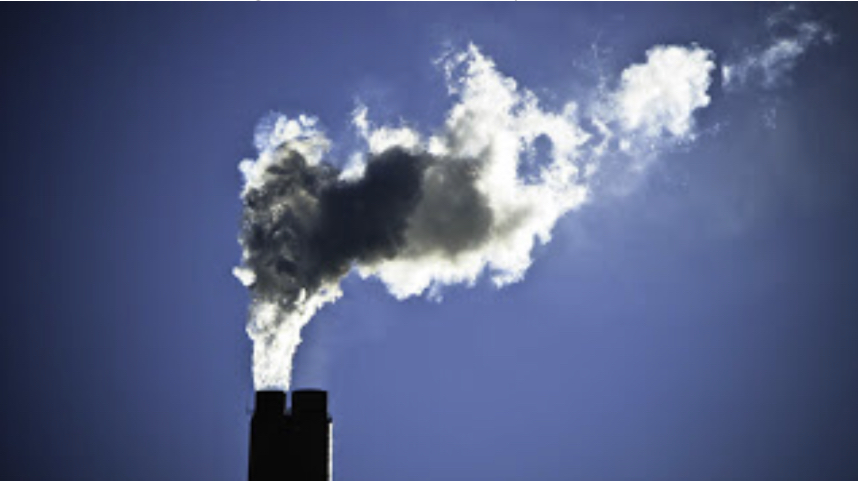Pollution/ Climate Change and How its Affecting our Planet Today
Air pollution is slowly destroying our world as we know it- and it’s up to us to put an end to it.
May 4, 2021
You’re outside trying to enjoy the day with your friends. You realize that today seems especially hot compared to the rest of the week. Why is this? What causes this sudden change in temperature? This is called climate change. It is caused by global warming- the thinning of Earth’s Ozone Layer, which is the layer of our atmosphere that protects us from harmful ultraviolet rays produced by the sun. The thinning of this important part of our atmosphere causes poor air quality, heat stress, and other extreme weather that can be health hazardous.
Unfortunately, climate change has become a growing problem that risks the health of our planet.
According to Kurzgesagt, since the industrial revolution, humans have released over 1.5 trillion tons of carbon dioxide into the earth’s atmosphere. In 2019 alone, we were pumping out 37 billion carbon dioxide. “Each and every year, we pump out more and more greenhouse gases into the air, like carbon dioxide, nitrous oxide, methane, and more. With all greenhouse gases, we are emitting about 51 billion tons of carbon dioxide equivalents each year.”
Each ton of carbon dioxide that is released into the ozone layer thins it, making climate change worse.
Besides an increase in temperature, climate change causes other things to happen. The worst effect could possibly be changes in precipitation patterns. “This can cause crops and agriculture to die, giving unusually poor harvests, and sadly causing famine among the world. Billions could die in the worst case,” said Kurzgesagt.
NASA (National Aeronautics and Space Administration) concluded that additional effects could be heatwaves, a drastic increase in global temperature, rising sea levels, destructive hurricanes, and more.
However, recent events have brought a surprising twist regarding the health of our atmosphere. With the COVID-19 lockdown in March of 2020, many businesses around the world were forced to close to reduce the chances of COVID-19 spikes in cases and hospitalization. Only essential businesses, like hospitals and grocery stores were allowed to remain open. Many saw this as a huge blow to our country’s economic stability, as people were dismissed from their jobs or had to take a leave.
Amongst all this chaos, there was a bright side. Industrial pollution makes up 50% of air pollution, so as employees were instructed to stay at home, shuttered factories could no longer emit toxic pollutants into the atmosphere. Industrial transportation was restricted, meaning less carbon dioxide and toxic gases from big trucks and vehicles.
Not only did the halt of industrialization reduce air pollution, but water pollution as well. Hundreds of factories in India used to pump out tons of chemical waste into rivers and lakes. The Covid-19 lockdown shut down these factories, in turn reducing the amount of chemical waste in rivers and making them cleaner. Since the water is now relatively clean, fish and turtles now live and swim freely in the now non-toxic waters of lakes and rivers. This isn’t happening in just India, but everywhere else in the world as well. However, with the advent of vaccines and the decline of the coronavirus, factories have reopened. Those who live along those rivers are enjoying their time with the clean water that they may not have for long.
People wonder what they can do to affect our environment. Fortunately, there are many ways to reduce our carbon footprint. This includes eating foods like fruits, vegetables, beans, and grains instead of livestock- which cause 14.5 percent of manmade global greenhouse gas.
Another very effective way to combat pollution is abiding by “the five R’s”. The five R’s stand for:
–Refusing to use plastic/paper products. Products like these may seem harmless, but they end up polluting our landfills and even our oceans. Some of these products include paper plates or plastic straws. We can take the greener route by deciding to use glass plates and reusable metal straws.
–Reduce clutter by being mindful of what we really need when making purchases. The more clutter or trash that comes from houses, the more that ends up in landfills which pollutes the planet.
–Reuse your items, keeping them out of your trash by taking care of them and getting in as many uses as you can. This helps the planet and channels your inner creativity when you take one thing and make it into something new.
–Rot your food scraps and make them into a useful compost in the garden. If you’re not somebody with a green thumb, you can look for a food scrap drop-off center, such as a nearby community garden.
–Recycle plastic, paper, glass, or metal- such as tin cans- that you can’t reuse to keep these materials out of landfills. You could recycle these materials yourself by turning them into something useful, or you can drop them off at a local recycling center. For example, milk jugs and shampoo bottles can become furniture like picnic tables or even a playground set.
Lastly, an effective way to help reduce air pollution -the source of climate change- is to limit the use of vehicles that emit exhaust. Exhaust is waste gases that are usually emitted from engine vehicles, such as cars and trucks. Not only do these gases take a serious toll on our ozone layer, they are not something we want to breathe. Carbon monoxide blocks oxygen from vital organs like our lungs, brain, and heart. Thankfully, there are multiple ways to reduce exhaust emissions. One of them includes using vehicles that do not emit toxic gases, such as bikes or scooters. If you have a long distance to travel, you can still go green by investing in an electric or hybrid car or other hybrid vehicles. Instead of using gas, these vehicles use electricity to power their engines. You can also consider public transportation, such as buses or trains that carry lots of people at the same time, thus using less gas.
However you choose to go green, it is very important to contribute to the fight to save our planet. We must all do our part. Failure to understand the seriousness of pollution and climate change could result in disastrous consequences. A little more care and mindfulness for our planet today can result in a healthier, greener planet tomorrow.






